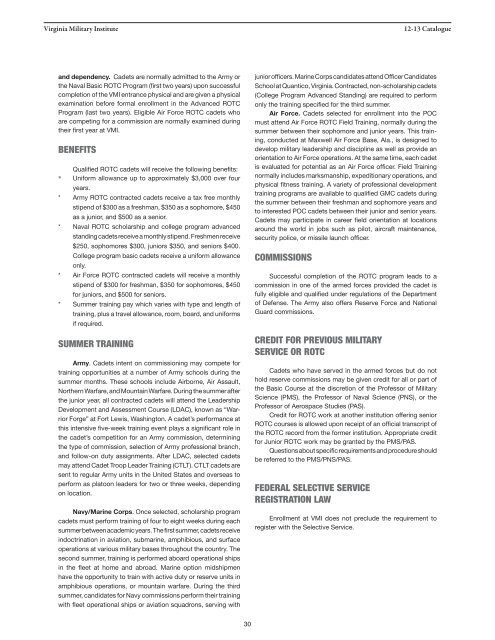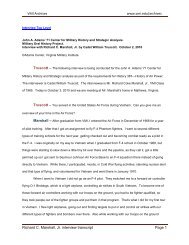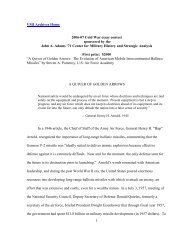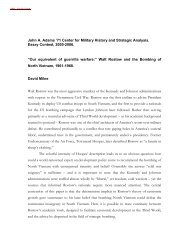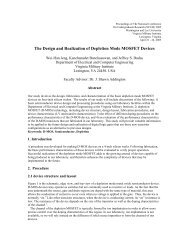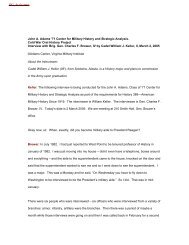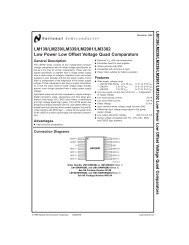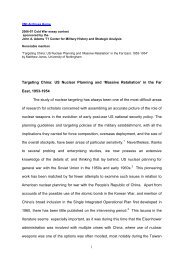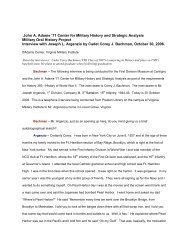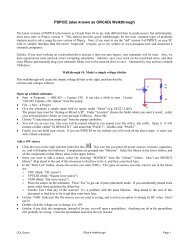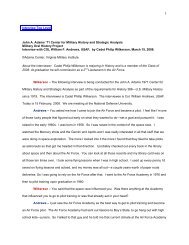Academic Catalog - Virginia Military Institute Admissions
Academic Catalog - Virginia Military Institute Admissions
Academic Catalog - Virginia Military Institute Admissions
Create successful ePaper yourself
Turn your PDF publications into a flip-book with our unique Google optimized e-Paper software.
<strong>Virginia</strong> <strong>Military</strong> <strong>Institute</strong><br />
12-13 <strong>Catalog</strong>ue<br />
and dependency. Cadets are normally admitted to the Army or<br />
the Naval Basic ROTC Program (first two years) upon successful<br />
completion of the VMI entrance physical and are given a physical<br />
examination before formal enrollment in the Advanced ROTC<br />
Program (last two years). Eligible Air Force ROTC cadets who<br />
are competing for a commission are normally examined during<br />
their first year at VMI.<br />
BENEFITS<br />
Qualified ROTC cadets will receive the following benefits:<br />
* Uniform allowance up to approximately $3,000 over four<br />
years.<br />
* Army ROTC contracted cadets receive a tax free monthly<br />
stipend of $300 as a freshman, $350 as a sophomore, $450<br />
as a junior, and $500 as a senior.<br />
* Naval ROTC scholarship and college program advanced<br />
standing cadets receive a monthly stipend. Freshmen receive<br />
$250, sophomores $300, juniors $350, and seniors $400.<br />
College program basic cadets receive a uniform allowance<br />
only.<br />
* Air Force ROTC contracted cadets will receive a monthly<br />
stipend of $300 for freshman, $350 for sophomores, $450<br />
for juniors, and $500 for seniors.<br />
* Summer training pay which varies with type and length of<br />
training, plus a travel allowance, room, board, and uniforms<br />
if required.<br />
SUMMER TRAINING<br />
Army. Cadets intent on commissioning may compete for<br />
training opportunities at a number of Army schools during the<br />
summer months. These schools include Airborne, Air Assault,<br />
Northern Warfare, and Mountain Warfare. During the summer after<br />
the junior year, all contracted cadets will attend the Leadership<br />
Development and Assessment Course (LDAC), known as “Warrior<br />
Forge” at Fort Lewis, Washington. A cadet’s performance at<br />
this intensive five-week training event plays a significant role in<br />
the cadet’s competition for an Army commission, determining<br />
the type of commission, selection of Army professional branch,<br />
and follow-on duty assignments. After LDAC, selected cadets<br />
may attend Cadet Troop Leader Training (CTLT). CTLT cadets are<br />
sent to regular Army units in the United States and overseas to<br />
perform as platoon leaders for two or three weeks, depending<br />
on location.<br />
Navy/Marine Corps. Once selected, scholarship program<br />
cadets must perform training of four to eight weeks during each<br />
summer between academic years. The first summer, cadets receive<br />
indoctrination in aviation, submarine, amphibious, and surface<br />
operations at various military bases throughout the country. The<br />
second summer, training is performed aboard operational ships<br />
in the fleet at home and abroad. Marine option midshipmen<br />
have the opportunity to train with active duty or reserve units in<br />
amphibious operations, or mountain warfare. During the third<br />
summer, candidates for Navy commissions perform their training<br />
with fleet operational ships or aviation squadrons, serving with<br />
junior officers. Marine Corps candidates attend Officer Candidates<br />
School at Quantico, <strong>Virginia</strong>. Contracted, non-scholarship cadets<br />
(College Program Advanced Standing) are required to perform<br />
only the training specified for the third summer.<br />
Air Force. Cadets selected for enrollment into the POC<br />
must attend Air Force ROTC Field Training, normally during the<br />
summer between their sophomore and junior years. This training,<br />
conducted at Maxwell Air Force Base, Ala., is designed to<br />
develop military leadership and discipline as well as provide an<br />
orientation to Air Force operations. At the same time, each cadet<br />
is evaluated for potential as an Air Force officer. Field Training<br />
normally includes marksmanship, expeditionary operations, and<br />
physical fitness training. A variety of professional development<br />
training programs are available to qualified GMC cadets during<br />
the summer between their freshman and sophomore years and<br />
to interested POC cadets between their junior and senior years.<br />
Cadets may participate in career field orientation at locations<br />
around the world in jobs such as pilot, aircraft maintenance,<br />
security police, or missile launch officer.<br />
COMMISSIONS<br />
Successful completion of the ROTC program leads to a<br />
commission in one of the armed forces provided the cadet is<br />
fully eligible and qualified under regulations of the Department<br />
of Defense. The Army also offers Reserve Force and National<br />
Guard commissions.<br />
CREDIT FOR PREVIOUS MILITARY<br />
SERVICE OR ROTC<br />
Cadets who have served in the armed forces but do not<br />
hold reserve commissions may be given credit for all or part of<br />
the Basic Course at the discretion of the Professor of <strong>Military</strong><br />
Science (PMS), the Professor of Naval Science (PNS), or the<br />
Professor of Aerospace Studies (PAS).<br />
Credit for ROTC work at another institution offering senior<br />
ROTC courses is allowed upon receipt of an official transcript of<br />
the ROTC record from the former institution. Appropriate credit<br />
for Junior ROTC work may be granted by the PMS/PAS.<br />
Questions about specific requirements and procedure should<br />
be referred to the PMS/PNS/PAS.<br />
FEDERAL SELECTIVE SERVICE<br />
REGISTRATION LAW<br />
Enrollment at VMI does not preclude the requirement to<br />
register with the Selective Service.<br />
30


